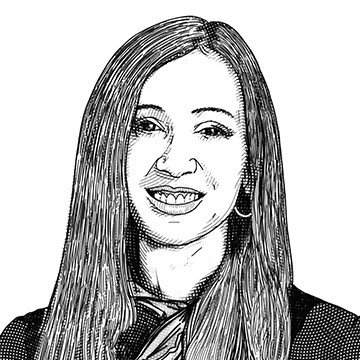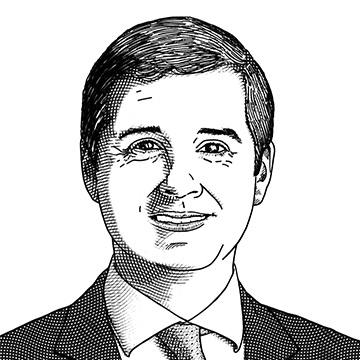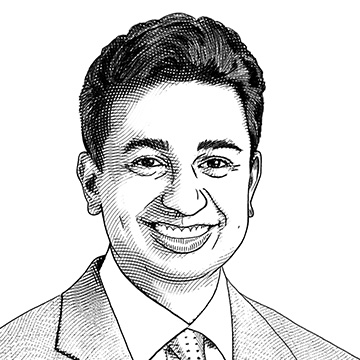KEY TOPIC
Data-Driven
How can data help make decisions about a patient's care?
Edited by Bentley Boyd
Photo: Getty Images | Illustrations by Ken Kula

Tara Karamlou, MD, MSc
Tara Karamlou, MD, MSc
Data is at the cornerstone of understanding our performance, which is how we improve and provide higher value-based care. At present, we’re in a “data revolution,” such that transforming the ways in which we collect, analyze and use data are more critical than ever to best match patients to procedures. Heart surgery is probably at the apex of the high-risk hierarchy. The margin for error is vanishingly small. If you don’t look carefully at the data in a sophisticated way, you won’t understand the differentiators —the elements that are Cleveland Clinic’s “secret sauce.” We use data to improve performance and to differentiate ourselves, to understand what we do well and to mitigate what we could improve upon.
Tara Karamlou, MD, MSc, is a pediatric and congenital heart surgeon in the Department of Thoracic and Cardiovascular Surgery at the Sydell and Arnold Miller Family Heart, Vascular & Thoracic Institute.
Hometown: Seattle
First job: Ballet dancer, Pacific Northwest Ballet
Undergraduate education: University of Washington
Currently reading: Rereading Tess of the d’Urbervilles by Thomas Hardy
Pastime pleasure: Long-distance running

Nicolas Piuzzi, MD
Nicolas Piuzzi, MD
Medical data is doubling almost every two months. The challenge we face as physicians is: What do we do with this data? We’ve created (out of the thousands and thousands of patients in our care) predictive models on surgical outcomes. When a patient comes to see us before surgery, using our predictive model, we can determine the likelihood of a positive outcome and predict how long the patient will stay in the hospital and the risk of being readmitted. Knowing this allows the physician and the patient to make an informed decision before moving forward, through a personalized, data-driven approach. The model allows us to invest the right resources targeted to the patients who need them the most.
Nicolas Piuzzi, MD, is an orthopaedic surgeon and serves as Director of Adult Reconstruction Research and Co-Director of the Musculoskeletal Research Center.
Hometown: Buenos Aires, Argentina
First job: Working in my grandfather’s metallurgic shop
Undergraduate education: Universidad del Salvador in Buenos Aires
Currently reading: Built to Last: Successful Habits of Visionary Companies by Jim Collins and Jerry Porras
Pastime pleasure: I go fishing as much as I can.

Sunil Srivastava, MD
Sunil Srivastava, MD
Dr. Justis Ehlers and I were part of the Third Frontier grant from the State of Ohio. We built a software platform that allows us to perform advanced analysis on our most common imaging technology: optical coherence tomography (OCT). We’ve been able to further develop this software to extract features from OCT which provide early clues on eye disease progression. Now Cleveland Clinic is one of the world’s experts on how these features in imaging can change early in disease. This provides an early imaging marker that potential drug therapies can be tested against, to see if novel therapies could slow down the disease. You have to stay focused on how data and process are going to improve care.
Sunil Srivastava, MD, is a vitreoretinal surgeon who sees patients in the Ophthalmology Department at the Cole Eye Institute.
Hometown: New York City
First job: Resident advisor at Cornell University
Undergraduate education: Cornell University
Currently reading: The Economist
Pastime pleasure: I’m starting pickleball lessons!

Kristen Ban, MD
Kristen Ban, MD
In colorectal surgery, we leverage data to guide patient care in many ways. Data from prospective clinical trials and retrospective reviews inform evolving clinical care pathways and best-practice guidelines. As one of the highest-volume colorectal surgery divisions in the world, we are proud of the Cleveland Clinic contribution to research in our field, which has in turn impacted patient care globally. Data is also critical for effective quality improvement. Tracking compliance with best practices and patient outcomes helps identify areas for improvement to ensure our patients continue to receive the best possible care.
Kristen Ban, MD, is a colorectal surgeon at Cleveland Clinic Fairview Hospital.
Hometown: Chicago
First job: Cleveland Clinic Fairview Hospital
Undergraduate education: Duke University
Currently reading: Project Hail Mary by Andy Weir
Pastime pleasure: Cycling, travel
